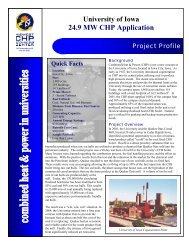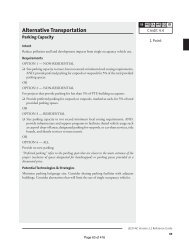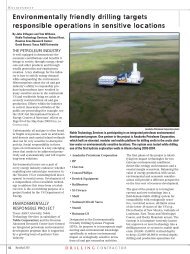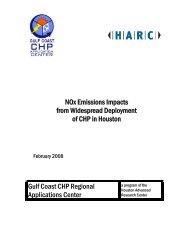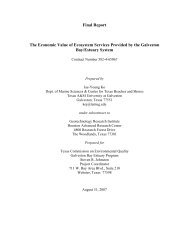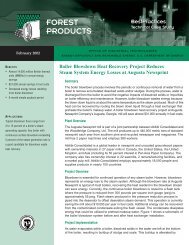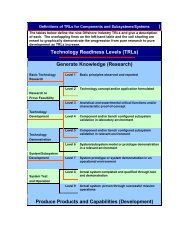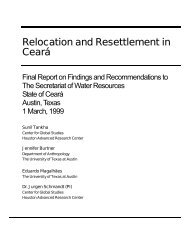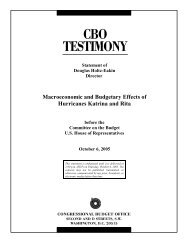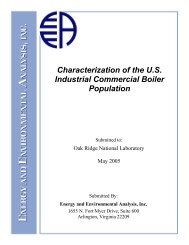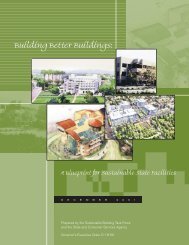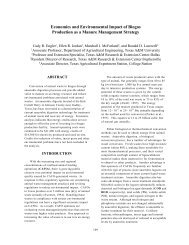The Economic Value of Water and Ecosystem Preservation
The Economic Value of Water and Ecosystem Preservation
The Economic Value of Water and Ecosystem Preservation
Create successful ePaper yourself
Turn your PDF publications into a flip-book with our unique Google optimized e-Paper software.
Contributes actively to the conservation <strong>of</strong> natural <strong>and</strong> cultural<br />
heritage, includes local <strong>and</strong> indigenous communities in its planning,<br />
development <strong>and</strong> operation, contributing to their well-being,<br />
Interprets the natural <strong>and</strong> cultural heritage <strong>of</strong> the destination to<br />
visitors, lends itself better to independent travelers, as well as to<br />
organized tours for small size groups (United Nations Environment<br />
Programme (UNEP), 2003).<br />
Ecotourism is not necessarily sustainable; however, it can be if conducted in<br />
a thoughtful manner. This form <strong>of</strong> ecotourism can be preferable to alternative<br />
forms <strong>of</strong> economic development such as logging, mining, or agriculture, because<br />
it has the potential to protect natural areas <strong>and</strong> benefit local people at the same<br />
time (Sekercioglu, 2002). “Well-planned <strong>and</strong> managed ecotourism may prove to<br />
be the most effective tool for long-term conservation <strong>of</strong> biodiversity when the right<br />
circumstances (such as market feasibility, management capacity at local level,<br />
<strong>and</strong> clear <strong>and</strong> monitored links between ecotourism development <strong>and</strong><br />
conservation) are present (United Nations Environment Programme (UNEP),<br />
2003).”<br />
In the context <strong>of</strong> this report, we use the term “ecotourism” to imply nonconsumptive,<br />
nature based tourism that is not necessarily sustainable. <strong>The</strong><br />
reason for this is mainly because the economic impact <strong>of</strong> consumptive uses <strong>of</strong><br />
nature based resources (hunting <strong>and</strong> fishing) have already been evaluated in the<br />
San Antonio Bay Region (along with many other Texas coastal regions). 3<br />
Birding, hiking, camping, boating <strong>and</strong> other forms <strong>of</strong> ecotourism are growing<br />
in popularity among Americans. <strong>The</strong>se activities bring an economic dimension to<br />
communities as people come to experience the natural resources <strong>and</strong> spend<br />
their money on goods <strong>and</strong> services provided by local communities. Trip-related<br />
expenditures for wildlife viewing across the United States accounted for about<br />
$8.2 billion in 2000. Texas ranked fourth in total economic output related to<br />
wildlife watching expenditures at $2.46 billion, resulting in 28,377 jobs across the<br />
state (US Fish <strong>and</strong> Wildlife Service, 2001). Birdwatchers are one <strong>of</strong> the best<br />
sources <strong>of</strong> ecotourism income since they form the largest single group <strong>of</strong><br />
ecotourists, are educated, <strong>and</strong> have above average incomes. <strong>The</strong> National<br />
Survey on Recreation <strong>and</strong> the Environment reported that the percentage <strong>of</strong><br />
Americans that participated in birding one or more times in the past twelve<br />
months has increased from 12% in 1982-83 to 33% in 2000-2001 (US Fish <strong>and</strong><br />
Wildlife Service, 2003b). Approximately 2,268,000 birders visit Texas annually, <strong>of</strong><br />
which 94% are from in state <strong>and</strong> 6% are from out-<strong>of</strong>-state (US Department <strong>of</strong> the<br />
Interior, Fish <strong>and</strong> Wildlife Service et al., 2003).<br />
3 For a discussion <strong>of</strong> the economic value <strong>of</strong> consumptive uses <strong>of</strong> nature-based resources, see Jones, Lonnie L. <strong>and</strong> A.<br />
Tanyeri-Abur. 2001. Impacts <strong>of</strong> Recreational <strong>and</strong> Commercial Fishing <strong>and</strong> Coastal Resource-Based Tourism on Regional<br />
<strong>and</strong> State Economies. TR-184, Texas <strong>Water</strong> Resources Institute, Texas A&M Univ., College Station.<br />
19



